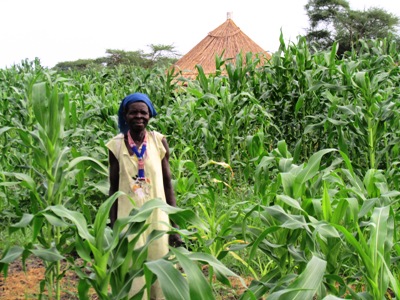FEATURE: Jonglei farmer urges Murle to embrace farming
July 4, 2015 (BOR) – Mary Philip Lokila, 69, is busy working on her large farm dominated by maize, which she planted this season in South Sudan’s Jonglei state.

“I call on the rest of my tribe mates to adopt mixed life of keeping cattle and food crop production in fertile area,” proudly says Lokila.
Her farm is located just right next to a corner near Pibor River, meaning the prominent farmer gets enough water supply for crops and domestic animals.
Mary is, however, optimistic that engagement in food production would eventually reduce crime rates within the Greater Pibor region.
“None of my tribe mates, especially women have eaten enough food due to scarcity of resources,” narrates the 69-year old farmer.
She said women suffer day and night to provide food for the family.
“The women in this community are like bees, working day and night to provide food for the rest of the members. But after preparing the meal, she must eat last after her husband and all the kids have no space left in the bellies to accommodate the remaining food, that is when she can now eat, otherwise she sleeps hungry”, she laments.
But Lokila admits the work women do is rooted in family cultures and traditions.
“In farms, women are the majority producing maize meant just for roasting, she never has to cultivate properly because they are forced out by family issues. If men can accept to cultivate like us, we will have a joint force to liberate communities from hunger”, she says.
A farmer since 1960, Lokila married a soldier-turned priest, Philip Lokila. Currently, her farm is approximately three fedans, which she ploughs manually since her village has never before seen a tractor.
The renowned farmer is still skeptical about the use of cattle to plough gardens, citing the problems attached to its management.
“When you see the cattle, the tail does not rest, winging it left-side, right-side, that is symbolising how restless you would be as the owner in life. To me, we should avoid that and sit down in a permanent settlement, build houses instead of living in plastic sheets under trees,” says Lokila.
“If we cultivate our crops and keep your cattle in a permanent settlement, we would have both animal products and crops to eat and life will go well”, she adds.
HUGE HARVEST
Last year, the 69-year old farmer reportedly sold to the locals 65 bags of maize and sorghum she harvested from her farm. She was also the main seed provider to those who came from the different villages.
Charles Gain, a resident of Pibor, said he fully supports Lokila’s farming techniques.
(ST)
